Steve Ackroyd, of Palmers Green, North London, was diagnosed with an inoperable brain tumour, later identified as a glioblastoma, in August 2022. For months the TV editor had been suffering with seizures and he was initially misdiagnosed with and treated for epilepsy. The 47-year-old had a biopsy before being treated with radiotherapy and chemotherapy. He is now on second-line chemo and undergoing immunotherapy treatment in Germany, financed through a crowdfunding page his wife set up.
Here is Steve’s story, as told by his wife Francesca …
Before his diagnosis, Steve was working incredibly hard as an editor for TV shows like Sex Education and Catastrophe, as well as commercials. He was cycling into town for work every day from our home in Palmers Green, North London, and was super fit. We had a really busy, great family life. I was working as a freelance interior designer whilst bringing up our daughter Autumn, who is now 11. We spent time with friends and family and went to lots of art galleries and theatres. We were happy to be able to go out and have fun again after the pandemic and were enjoying our lives.
We always thought these things happened to other people and still can’t believe it’s happening to us now.

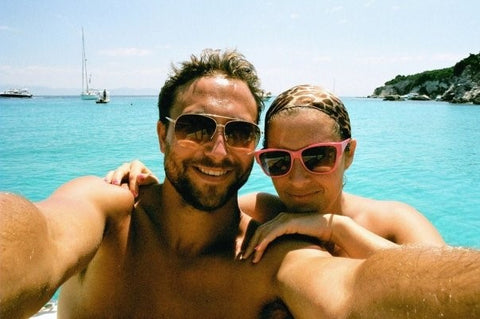
The first sign that anything was wrong came in June 2022 when Steve had a crazy seizure in the middle of the night. I called an ambulance but he was so distressed the paramedics, worried about the state he was in, also called police. They carted him off to our local hospital, North Middlesex University Hospital (North Mid).
After his very first seizure, which was absolutely horrendous, the A&E doctor assured us it wouldn’t happen again.
Steve returned to hospital about six weeks later and again roughly two weeks after that following further seizures. On the first and third occasion he was given CT scans but they wouldn’t scan him the second time because he’d recently had one.
Something was picked up on both scans but it was attributed to ‘bad head positioning’ and we were told it was clear and sent home.

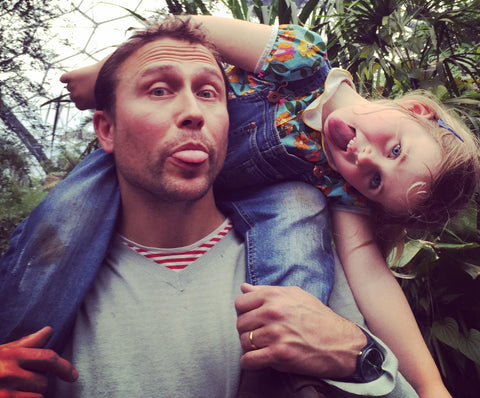
We wanted to see a neurologist so booked an appointment with our GP who told us they couldn’t do anything to expedite our referral. Going by National Institute for Health and Care Excellence (NICE) guidelines, we should have seen a neurologist in about two weeks but it actually took 10 weeks in the end.
A radiologist friend told us to get an MRI because people don’t have seizures for no reason, so we returned to the GP who advised us to pay privately.
We met with a private neurologist who, after hearing about the clear CT scans Steve had got and the MRI scan he had coming up, diagnosed him with epilepsy and prescribed pregabalin. It wasn’t until Steve’s tumour was diagnosed three months later that he was given Keppra, which took his tonic clonic seizures to more manageable partial ones. By the time his MRI scan came around, we were convinced we were just going through the motions, nothing more than a tick box exercise because we already had the epilepsy diagnosis.
So, when the technician said there was something ‘very wrong’ and told us to go to our nearest A&E department, it wasn’t what we had been expecting.
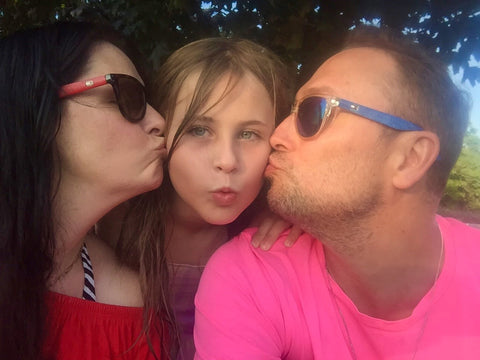
We went straight to the University College London Hospital (UCLH) where Steve was diagnosed with a brain tumour. The first we knew about it was when a doctor came into the cubicle Steve was in and said ‘you know this brain tumour you’ve got?’. Steve was on an acute medical ward and it seemed like every junior doctor wanted to talk to him. It was exhausting. One nurse told us we’d taken the news very well and reminded us there’s always hope.
We were still in shock about the brain tumour diagnosis and didn’t know then how bad it was.
In September, Steve had a biopsy at the National Hospital for Neurology and Neurosurgery (NHNN) in Queen Square, London. The histology of his tumour led us to believe it was a low-grade tumour, which was a huge relief. Sadly though, the results we were given later were much worse. It took a long time to get the molecular study done on it. This took place in Germany and, although it was deemed to be a poor sample, which was even more frustrating, on what they had been able to rule out we were told it could only be a grade 4 glioblastoma.
This was devastating because we knew it was a very aggressive tumour.
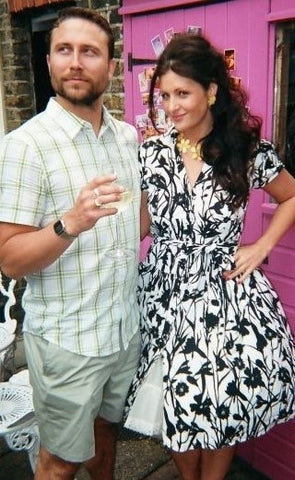
They started making plans for Steve to start radiotherapy and chemotherapy even before his biopsy results came back. He did 27 rounds of radiotherapy at UCLH from mid-November to mid-December, which he absolutely sailed through, and two rounds of temozolomide chemo, which he started in January. Steve’s tumour is methylated so should respond better to chemo but, unfortunately, it hasn’t responded how we had hoped. He's now on a second-line chemo, lomustine, and about to start his third course.
After his radiotherapy treatment finished, Steve started getting cluster seizures, sometimes as many as eight in a day.
He was admitted to hospital between Christmas and New Year and then again in January. We were told this was the result of his brain swelling from the radiation and it did calm down, but then he suffered a four-hour seizure and lost the use of his left leg. He was conscious the whole time and the paramedics said they’d never seen anything like it.
He’s got a right-sided cancerous growth so it’s his left side that’s affected.
It got weaker after each cluster seizure but he could walk unaided until that four-hour one, which really caused him to decline physically. Steve spent three weeks in a physio rehabilitation facility and is still doing the exercises he’s been given. He’s seen a definite improvement as a result and we’re so grateful to everyone at the Magnolia Unit in Enfield for the help they gave him, but his mobility still isn’t what it was before.
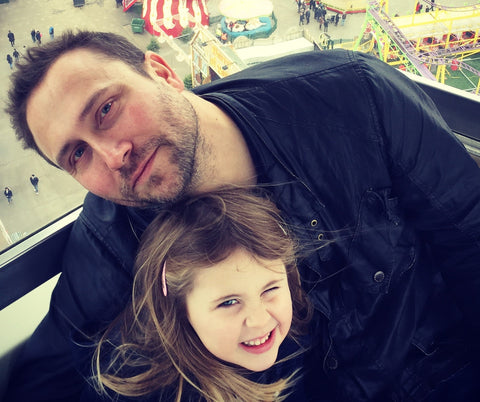
It was about this time that I fell down a rabbit hole of researching everything I possibly could.
I’m on forums and Facebook groups with people from all over the world and have found it shocking learning about treatments and access to treatment in countries like the US compared to the UK. There are a lot of things proven to do well that aren’t available here and should be. I set up a GoFundMe page to help raise the funds needed to source treatment from overseas and am so thankful for the generosity of friends, family and strangers who have donated thus far.
We’ll be making our second visit to the IOZK Immuno-Oncological Centre in Cologne, Germany, next week.
The treatment Steve’s undertaking is called immunogenic cell death (ICD), which he is having between each cycle of chemo. He’ll have up to five courses of this and then two cycles of a vaccine. The idea is to elicit a tumour-specific immune response by training Steve’s body to recognise his tumour as something foreign so it attacks it rather than lets it live organically, which is what’s happening at the moment.

Travelling with a seizure-prone husband isn’t easy but, thankfully, we have amazing friends who are prepared to drive us to Germany and back.
I don’t want Steve flying and don’t drive myself, so having him lose his licence has added another level of complication, and expense. I’ve been really naïve about the costs involved and am worried about how quickly we’re getting through the money that has been donated. If we’re able to stick to plan A, we’ll have another seven visits to make. If not, we’ll move onto the vaccine stage sooner. It’ll take at least a few months for the vaccine to work so we have to be careful not to leave it too late.
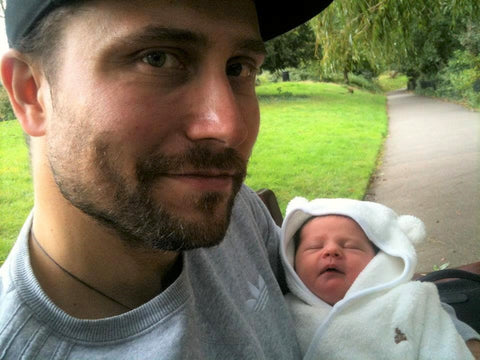

I was so terrified at the beginning of this process that it took me a while to pluck up the courage to research unconventional treatments, especially because doctors tell you to stay off the internet.
However, I’ve found in situations like ours, the internet is absolutely what you need to turn to as it’s the only way of getting all the information you need. We belong to a ‘thriving and surviving’ support group, which has been an absolute godsend because living and fighting is so much more bearable than the alternative. Glioblastoma are multifaceted tumours and, as such, you can’t do just one thing to treat them, you have to attack them from lots of different avenues.
Sadly, we’ve had to advocate for ourselves a lot, like when we’ve received appointments for nine months’ time, which is absurd for a GBM patient.
Thankfully, Steve’s really on the ball and I’m happy to push people to make things happen, but it is exhausting. We’ve managed to get around this by speaking to consultants’ secretaries but I do worry about people who don’t have someone fighting in their corner because they would be so lost.
We’re really uncomfortable asking people for money but everything we get will help us continue fighting this horrid disease.
At the moment Steve can’t move without feeling like he’s going to have a seizure. He’s also experiencing some short-term memory loss, fatigue and, of course, the weakness on his left side, but luckily it hasn’t affected any of his mental faculties. With Steve undergoing treatment and me his full-time carer, we have no money coming in and, despite my reassurances, he is terrified of leaving our family in debt. On top of that and our medical and travel expenses, we’re also spending about £700 a month on supplements and off-label pharmaceutical drugs, including cannabidiol (CBD), because we’re throwing everything we can at this.


Whatever happens, Steve’s fighting and so am I.
What we’re doing will hopefully give Steve a good few years, if not more, and we know we can survive in fighting mode. Having the NHS tell us ‘that’s it, off you go, here’s the number for your local hospice’, without having any other options, would be horrendous. As it is, Steve’s cancer treatment was delayed by about three months because of his delayed diagnosis and, with this disease, that could make a huge difference. Anyone wishing to make a donation can do so at www.gofundme.com/f/steve-ackroyds-brain-tumour-treatment.
Francesca Ackroyd
July 2023
Brain tumours are indiscriminate; they can affect anyone at any age. What’s more, they kill more children and adults under the age of 40 than any other cancer... yet historically just 1% of the national spend on cancer research has been allocated to this devastating disease.
Brain Tumour Research is determined to change this.
If you have been inspired by Steve's story, you may like to make a donation via www.braintumourresearch.org/donation/donate-now or leave a gift in your will via www.braintumourresearch.org/legacy
Together we will find a cure.

